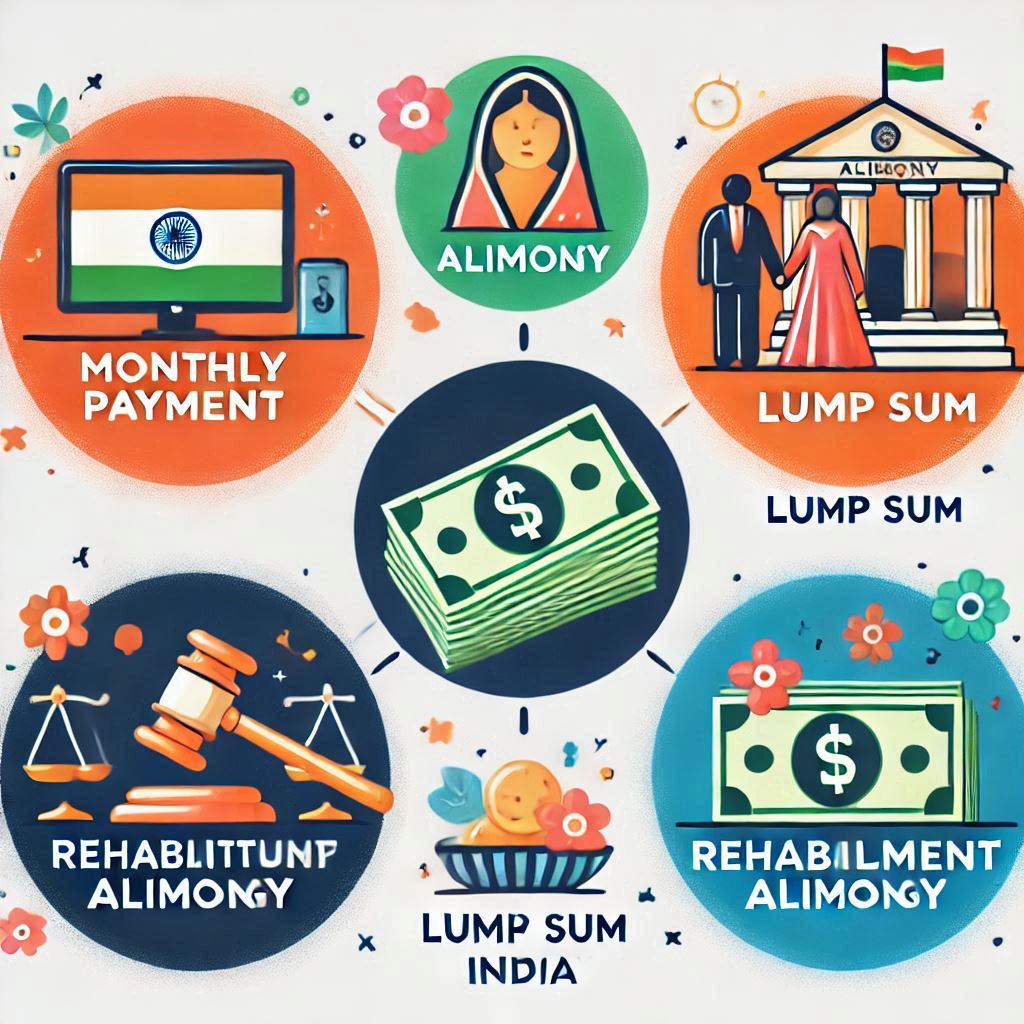Alimony, also referred to as maintenance, is the financial support one spouse provides to the other during or after the dissolution of a marriage. In India, this legal obligation is governed by various personal laws and statutory provisions based on religion, customs, and individual circumstances. Understanding the types of alimony in India temporary, permanent, and lump sum is crucial for navigating the complexities of divorce and separation.
Understanding the types of alimony in India, including temporary, permanent, and lump sum, is crucial for individuals navigating the complexities of divorce and separation.
Temporary Alimony in India
Temporary alimony, often referred to as maintenance pendente lite, is awarded during the pendency of legal proceedings to ensure financial stability for the spouse who may not have the means to support themselves.
Key Features of Temporary Alimony:
- Purpose: To provide financial support during divorce or judicial separation proceedings.
- Duration: Granted only for the duration of the legal process.
- Eligibility: Either spouse can claim, but the court assesses financial need.
Relevant Provisions:
- Hindu Marriage Act, 1955: Section 24.
- Special Marriage Act, 1954: Section 36.
- Indian Divorce Act, 1869: Section 36.
- BNSS, 2023: Section 144 (interim maintenance).
Factors Considered by Courts:
- Income and financial status of both spouses.
- Dependents and responsibilities.
- Reasonable expenses required for sustenance.
Permanent Alimony in India
Permanent alimony is awarded as a one-time settlement or periodic payments post-divorce to ensure the financial security of the economically weaker spouse.
Key Features of Permanent Alimony:
- Purpose: To secure financial stability for the rest of the recipient’s life.
- Mode of Payment: Can be monthly, annually, or a lump sum amount.
- Eligibility: Generally awarded to the spouse unable to maintain themselves post-divorce.
Relevant Provisions:
- Hindu Marriage Act, 1955: Section 25.
- Special Marriage Act, 1954: Section 37.
- Indian Divorce Act, 1869: Section 37.
- Muslim Women (Protection of Rights on Divorce) Act, 1986: Section 3.
Factors Considered by Courts:
- Income, assets, and financial status of both parties.
- Duration of the marriage.
- Age, health, and earning capacity of the recipient spouse.
- Conduct of parties during the marriage.
Lump Sum Alimony in India
Lump sum alimony refers to a single, one-time payment made by one spouse to the other as full and final settlement of maintenance obligations.
Key Features of Lump Sum Alimony:
- Purpose: To avoid long-term financial entanglements between parties.
- Flexibility: Preferred for its simplicity and finality.
- Eligibility: Typically negotiated and agreed upon by both parties or directed by the court.
Relevant Provisions:
- Hindu Marriage Act, 1955: Section 25 allows courts to order lump sum payments.
- Special Marriage Act, 1954: Section 37 provides similar provisions.
Factors Considered by Courts:
- Total income and assets of the paying spouse.
- Need for financial independence of the recipient.
- Mutual consent between parties for a lump sum arrangement.
Factors Influencing Alimony Amounts
The quantum of alimony—whether temporary, permanent, or lump sum—is determined based on various factors, including:
- Standard of Living: The lifestyle maintained during the marriage.
- Financial Capacity: Income, assets, and liabilities of both spouses.
- Duration of Marriage: Longer marriages may result in higher alimony.
- Dependent Children: Expenses related to child upbringing and education.
- Conduct of the Parties: Courts may consider marital misconduct in certain cases.
Understanding the types of alimony in India, including temporary, permanent, and lump sum, is essential for individuals navigating divorce or separation. With laws varying across personal and general statutes, seeking legal advice tailored to one’s circumstances is critical. By knowing the provisions and factors influencing alimony decisions, individuals can make informed choices and protect their financial interests effectively.
FAQs on Types of Alimony in India
1. Can working spouses claim alimony?
Yes, a working spouse can claim alimony if their income is insufficient to meet reasonable expenses or maintain the standard of living enjoyed during the marriage.
2. Is alimony taxable in India?
Yes, alimony received as periodic payments is considered taxable income under the Income Tax Act. Lump sum alimony, on the other hand, is not taxable.
3. Can alimony be denied?
Yes, alimony can be denied if the court finds that the claimant has sufficient means to maintain themselves or has engaged in marital misconduct.
4. Does remarriage affect alimony?
Yes, remarriage of the recipient spouse usually terminates the obligation of the paying spouse to continue alimony payments.
5. What happens if the spouse refuses to pay alimony?
Non-payment of alimony can lead to legal action, including attachment of property or imprisonment under Section 144(3) of the BNSS.




